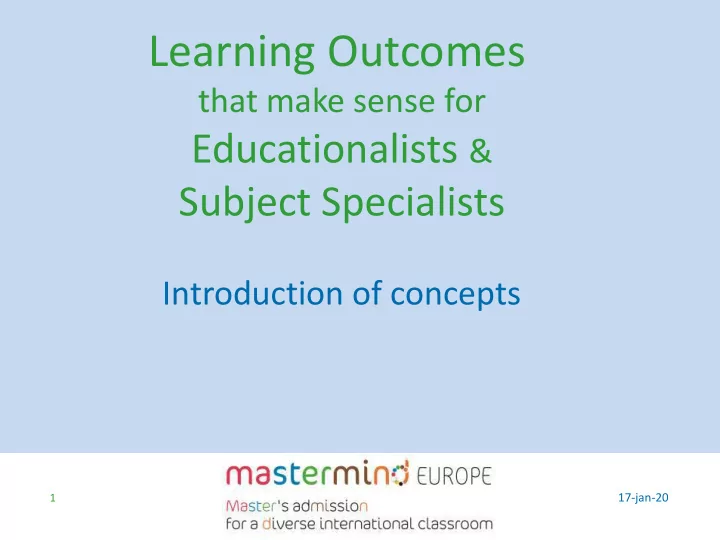

Learning Outcomes that make sense for Educationalists & Subject Specialists Introduction of concepts 17-jan-20 1
Key messages presentation 1 1. Master’s education is getting too diverse to define one set of research competencies 2. Research competencies are not restricted to subject-specific knowledge & skills; they also encompass General Academic, Personal and Linguistic competencies 3. High quality Master’s programmes need a coherent framework of research competencies and related learning outcomes 17-jan-20 2
Key messages presentation 2 1. Learning outcomes are crucial to improve competencies of Master’s graduates 2. Master’s programmes need Learning Outcomes in: Subject, Academic, Personal, & Linguistic skills 3. Assessment of Learning Outcomes is subjective, at best intersubjective 17-jan-20 3
1. Learning outcomes are crucial • Dublin descriptors: circular & not specific: “… knowledge and understanding that is founded upon and extends and/or enhances that typically associated with Bachelor’s level…” http://ecahe.eu/w/index.php/Dublin_Descriptors 17-jan-20 4
1. Learning outcomes are crucial • Definition of Learning Outcomes “Learning outcomes are statements of what a student should know, understand or be able to do at the end of a learning proces. ” https://www.cedefop.europa.eu/files/4156_en.pdf 17-jan-20 5
1. Learning outcomes are crucial • Components of Learning Outcomes – Criteria: What is it that students have to be good at? What kind of knowledge, skill, behaviour, attitude? – Norms: How good do students have to be at it? What level of knowledge, skill, behaviour, attitude? What level is adequate, what level is inadequate? 17-jan-20 6
1. Learning outcomes are crucial • Use of Learning Outcomes – Can we build a testing instrument without knowing what to measure? – Testing: tools/processes to find out if students are good enough in the things they need to be good at? • Minimum for all students • Above minimum in some Learning Outcomes? 17-jan-20 7
1. Learning outcomes are crucial • Use of Learning Outcomes – Testing: tools/processes to find out of students are good enough in the things they need to be good at? • Minimum for all students • Above minimum in some Learning Outcomes? – Testing: an art, not a science • Imperfect approximations of reality • Intersubjectiveness and triangulation 17-jan-20 8
1. Learning outcomes are crucial • Use of Learning Outcomes Does it help if students know the Learning outcomes: – not only subject knowledge & skills, but also – General academic competencies? – Personal competencies? – Language competencies? 17-jan-20 9
2. Learning Outcomes: Subject, Academic, Personal, & Linguistic • Criteria & Norms: in what? • Four categories of things to be good (enough) in: – Subject-related knowledge & skills – General Academic Competencies – Personal Competencies & Traits – Linguistic competencies 17-jan-20 10
2. Learning Outcomes: Subject, Academic, Personal, & Linguistic • Coherent framework for development of scientific competencies for Master’s students Criteria Norms Tests e.g. E=MC 2 Subject Can apply independently thesis Academic Critical thinking Can identify logical In oral exam fallacies Group work Can work with ‘outsiders’ ?? Personal Can write paper With minor edits by Thesis? Language native speaker 17-jan-20 11
2. Learning Outcomes: Subject- related knowledge & skills • Not my competency • Discuss among academic specialists • Under guidance of Master’s director • Avoid academic hobbyism 17-jan-20 12
2. Learning Outcomes: General academic competencies • Revised Bloom’s taxonomy of Learning 17-jan-20 13
2. Learning Outcomes: General academic competencies • General Academic Competencies – AACU VALUE Rubrics (presentation 3) https://www.aacu.org/value-rubrics 17-jan-20 14
2. Learning Outcomes: General academic competencies • General Academic Competencies - Tests – Graduate Record Examination (GRE) – Graduate Management Admission Test (GMAT) – HEIghten suite NB none of these for Master’s graduation https://www.ets.org/gre https://www.mba.com/exams/gmat https://www.ets.org/heighten 17-jan-20 15
2. Learning Outcomes: Personal competencies & traits • Competencies → personality traits • Personality traits: Big 5 → Big 6 Hexaco 1. Honesty/humility 2. Emotional control 3. eXtraversion 4. Agreeableness 5. Conscientiousness 6. Openness https://en.wikipedia.org/wiki/HEXACO_model_of_personality_structure 17-jan-20 16
2. Learning Outcomes: Personal competencies & traits • Competencies: Great Eight 1. Leading & deciding 2. Supporting & cooperating 3. Interacting & presenting 4. Analysing & interpreting 5. Creating & Conceptualising 6. Organising & coping 7. Enterprising & performing 17-jan-20 17
2. Learning Outcomes: Personal competencies & traits • AACU VALUE Rubrics (presentation 3) 17-jan-20 18
2. Learning Outcomes: Linguistic competencies • Common European Framework of Languages (presentation 3) https://www.coe.int/en/web/common-european-framework-reference-languages/level- descriptions 17-jan-20 19
2. Learning Outcomes: additional remarks • Learning outcomes: coherence or professor’s hobbies? • Start at discipline or: Labour market → Degree profile → Learning Outcomes → Curriculum • Maybe : “ tasks/roles ” approach (mix of competencies) 17-jan-20 20
3. Learning Outcomes: subjective, at best inter-subjective • Learning Outcomes themselves are subjective • Assessment of Learning Outcomes is subjective • Intersubjectivity: not just one person • Triangulation: not just one assessment method 17-jan-20 21
Key messages presentation 2 1. Learning outcomes are crucial to improve competencies of Master’s graduates 2. Master’s programmes need Learning Outcomes in: Subject, Academic, Personal, & Linguistic skills 3. Assessment of Learning Outcomes is subjective, at best intersubjective 17-jan-20 22
Recommend
More recommend